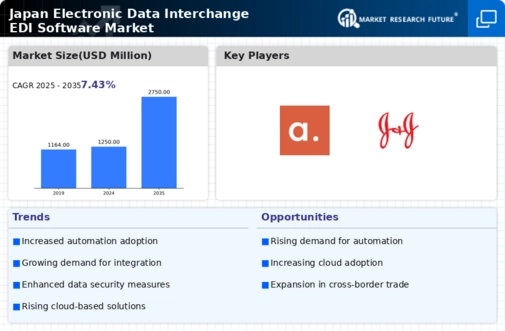Increased Focus on Data Security
In the Japan electronic data interchange software market, the emphasis on data security is intensifying. With the rise in cyber threats, organizations are prioritizing secure data exchange mechanisms to protect sensitive information. In 2025, a survey indicated that 70% of Japanese firms consider data security a critical factor when selecting EDI software. This heightened awareness is prompting software providers to enhance their security features, including encryption and access controls. As a result, businesses are more likely to invest in EDI solutions that offer robust security measures, thereby driving growth in the market.
Rising Adoption of Cloud-Based Solutions
The Japan electronic data interchange software market is witnessing a significant shift towards cloud-based EDI solutions. As organizations seek to enhance flexibility and scalability, cloud technology offers a viable alternative to traditional on-premise systems. In 2025, approximately 60% of Japanese companies reported utilizing cloud-based EDI systems, reflecting a growing preference for these solutions. The ability to access data from anywhere and the reduced need for extensive IT infrastructure are compelling factors driving this trend. Consequently, cloud-based EDI solutions are becoming increasingly integral to the operational strategies of Japanese businesses.
Growing Demand for Supply Chain Efficiency
The Japan electronic data interchange software market is experiencing a notable surge in demand for enhanced supply chain efficiency. Companies are increasingly recognizing the importance of streamlined operations to reduce costs and improve service delivery. In 2025, the logistics sector in Japan reported a growth rate of 4.5%, indicating a robust need for efficient data exchange solutions. EDI software facilitates real-time communication between suppliers and retailers, thereby minimizing delays and errors. This trend is likely to continue as businesses strive to optimize their supply chains, making EDI solutions indispensable for maintaining competitive advantage.
Emergence of Industry-Specific EDI Solutions
The Japan electronic data interchange software market is witnessing the emergence of industry-specific EDI solutions tailored to meet the unique needs of various sectors. Industries such as manufacturing, retail, and healthcare are increasingly adopting specialized EDI systems that cater to their operational requirements. In 2025, it was reported that the manufacturing sector accounted for 35% of EDI software usage in Japan, highlighting the demand for customized solutions. This trend suggests that as industries evolve, the need for specialized EDI solutions will likely grow, further driving the expansion of the market.
Government Initiatives Promoting Digital Transformation
The Japan electronic data interchange software market is benefiting from government initiatives aimed at promoting digital transformation across various sectors. The Japanese government has launched several programs to encourage the adoption of digital technologies, including EDI systems, to enhance operational efficiency. In 2025, government reports indicated that over 40% of small and medium-sized enterprises (SMEs) in Japan had adopted EDI solutions as part of their digital strategy. These initiatives not only facilitate the integration of EDI into business processes but also provide financial incentives for companies to invest in such technologies, thereby stimulating market growth.












